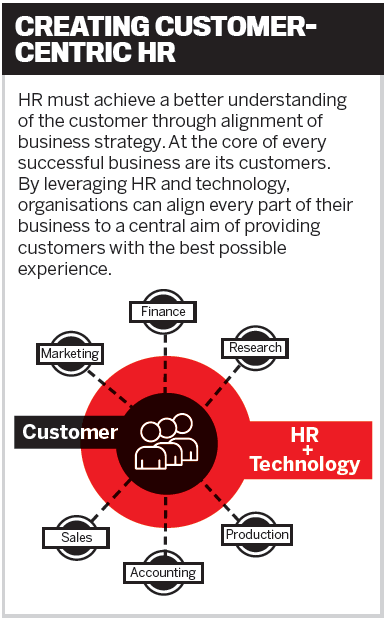
What’s in store for your strategic HR planning in 2018? HRD chats to Rob Bromage of intelliHR about key areas to consider, including HR’s critical alignment with customer needs

What’s in store for your strategic HR planning in 2018? HRD chats to Rob Bromage of intelliHR about key areas to consider, including HR’s critical alignment with customer needs
When talking about best practice for HR executives, Rob Bromage, CEO of people management and data analytics firm intelliHR, says it’s obvious that one of the biggest priorities for the profession needs to be ensuring their planning aligns with the vison of the CEO or MD from day one. “I actually think the number one thing people need to be doing before they even start thinking about planning for the year ahead is to get some time with their CEO or the business owner and really understand what the business is trying to achieve in the coming year,” he says. “It’s important to understand what might have changed or what new priorities the business might have, before you start doing your own departmental activity planning. It’s so important to be on the same page as the leader of the business so you understand the pain points and where they see the biggest challenges coming through for the year ahead.”
The second most important thing HR should do when considering their strategic planning is put themselves in the position of customers and contemplate what exactly they need from HR. According to Bromage, this is often left to others in the business but should be at the heart of all planning and decision-making.
“As HR people, we need to have a direct appreciation of the customer and how their needs are changing over time. Typically, it’s been a consideration left to the marketing function or the front line, but it’s imperative that HR plans around the customer so that they know the skills their people need to best service their customers. HR is best positioned to drive customer outcomes through people, so we really must become more customercentric in all of our thinking and planning. The only way to do that is to get in front of them,” Bromage says.
There’s no doubt that the role of HR needs to be better aligned to the business strategy. To have a successful business, all functions must be focused on how they can drive better customer experiences; for HR, it’s about how staff and management are supporting all of that. According to Bromage, the function must drive business performance through people strategy.
“The other key consideration for business is to provide sta with the right tools to allow them to do the best possible job they can,” he says.
Using people management technology for better business outcomes
It’s very true that many companies are still operating with manual HR systems, despite the fact that technology is at everyone’s fingertips 24/7. “Staff are on iPhones and social media platforms constantly, so we should be embracing this love for technology,” Bromage says.
It’s no coincidence that the market for HR technology in 2018 is booming. HRD surveyed over 650 readers and found that 64% of HR professionals planned to increase spend on HR technology in 2017, and support for HR technology is likely to gain even more momentum this year.
When it comes to HR technology, it’s really about shifting thinking, not looking at the tools of the past or just automating manual processes,” Bromage says. “It’s about focusing on the actual outcomes you’re trying to achieve and then selecting the right tools that are fit for that purpose. We need to understand that systems of the past don’t necessarily fit in with the tools of the future. So much has changed, even the expectations of staff. We must all step back and look at solutions.”
Bromage adds that HR professionals need to be able to successfully leverage new people management and data analytics platforms with minimum fuss.
“HR people typically have access to piles of data, but they need to be able to make better use of that data,” he says. “Platforms like intelliHR have been built with customers and usability front of mind, so it’s very easy to use, leading to high levels of adoption and helping to lift employee experience and value to the business.”
’A facilitator of business performance'
One of the biggest challenges facing executives today is that a business often has so many systems, and it’s extremely difficult to make them work together – hence we tend to fall back into manual processes.
“Many businesses just aren’t making things easy for themselves,” Bromage says. He adds that HR is not about administration and compliance or telling leaders how to manage.
“HR should be seen as the facilitator of business performance, and it should be about enablement and making things easier for staff to better look after their customers. You need data to understand where the trends are and a simple way to access and analyse it so you can improve the employee experience on all fronts, which will in turn change the customer experience – because, of course, happy staff equals happy customers equals ongoing and growing business,” he says. Bromage has recently listed his people management platform intelliHR on the ASX and says its popularity is reflective of changing attitudes towards the function of HR.
“When you look at a complete performance management framework, you’ve got goals and continuous feedback, recognition and reward, performance reviews and staff development. If I was an HR director I would want to put those tools directly in the hands of staff,” he says. “As people get back into the swing of things early in a new year, they are focused on starting the year off strong. So, if your staff aren’t coming back into work and self-starting their goal setting or feedback processes, then they’re automatically going to be on the back foot. We must arm our people directly with user-friendly and intuitive tools to give them the best possible chance of success, by having control over their own performance.”

Bromage offers a key tip to businesses leaders: you need to make sure you are continuously setting and revisiting goals, to maintain alignment with forever-changing business expectations. Let’s face it: businesses need to be agile in today’s highly competitive and global marketplace, and so do goals. Goals should be outcome-focused, while simultaneously allowing staff room to innovate and come up with creative solutions to real business and customer problems.
The intelliHR platform provides dynamic goal-setting capabilities, and at the same time uses a unique but simple continuous feedback system to connect leaders with their staff on another level.
“Together these tools provide a track to run on, facilitating meaningful conversations that add value to both the staff member and leader,” Bromage says. “If your staff are not engaged or unhappy, they may be lacking feedback or direction, or they may be just unsure as to the expectations the business has of them. Everybody needs to know exactly what is expected of them, have clearly articulated goals, a plan to achieve them, and a regular dialogue to stay agile and on track.”
The intelliHR platform encourages staff to have regular conversations about their goals, and empowers them to take responsibility for their performance. “I think like anything it’s about establishing a routine,” Bromage says. “HR needs to be responsible for creating discipline and value-adding processes in the business. Routine and discipline are incredibly difficult to establish if they don’t have a tool to make it easier and faster to do these things.”
Bromage sums up the value-add of people management software with the reminder that technology can provide employees with a future road map. “Technology equips our people with a track to run on and makes it easier to connect teams together,” he says.
Most HR professionals would acknowledge that people want purpose and they also want autonomy. According to Bromage, they also want to be recognised. “Everyone comes to work to do a good job. Simple things like continuous feedback, setting and establishing expectations, and keeping track of goals and how they are going shows employees that the business is investing in them, and sets them up for success. If everyone understands what they need to do and that is what the business actually wants, then you’ve got everyone on the bus, in the right seats, and the bus is moving forward in the right direction.”
 INTELLIHR
INTELLIHR
Rob Bromage is an HR technology specialist with more than 20 years’ experience. He is the managing director of intelliHR, a cloud-based people management platform that allows organisations to maintain a real-time handle on performance, creating a culture that contributes to strategic decision-making with data-driven insights.